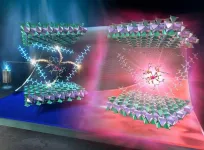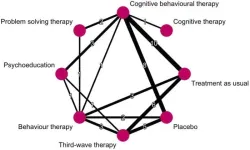(Press-News.org) Emerging evidence suggests that lycopene—a natural plant extract—may have antidepressant properties. New research in Food Science & Nutrition reveals the mechanisms behind its antidepressant effects.
In mice with depressive-like behaviors, brain analyses revealed impairments in the hippocampus. Lycopene treatment lessened these impairments and reversed the animals’ depressive-like traits.
Lycopene treatment boosted the expression of brain-derived neurotrophic factor (BDNF), a protein with roles in many aspects of brain function. Experiments indicated that a signaling pathway involving BDNF (called the BDNF-TrkB pathway, which helps regulate learning, memory, and communication between neurons) is inhibited in mice with depression, and that lycopene treatment alleviates this inhibition.
The study “offers an effective avenue for the development of novel antidepressant therapies,” the authors wrote. “We plan to conduct further verification in future studies and include multiple brain regions in our research.”
URL upon publication: https://onlinelibrary.wiley.com/doi/10.1002/fsn3.70003
Additional Information
NOTE: The information contained in this release is protected by copyright. Please include journal attribution in all coverage. For more information or to obtain a PDF of any study, please contact: Sara Henning-Stout, newsroom@wiley.com.
About the Journal
Food Science & Nutrition is an open access journal enabling the rapid dissemination of fundamental and applied research related to all aspects of food science and nutrition, as well as interdisciplinary research that spans these two fields. We believe that all research, so long as it is evidence-based and factually correct, deserves a forum to be read and commented upon. We therefore strive to be an author-friendly journal welcoming all contributions of sound science.
About Wiley
Wiley is one of the world’s largest publishers and a trusted leader in research and learning. Our industry-leading content, services, platforms, and knowledge networks are tailored to meet the evolving needs of our customers and partners, including researchers, students, instructors, professionals, institutions, and corporations. We empower knowledge-seekers to transform today’s biggest obstacles into tomorrow’s brightest opportunities. For more than two centuries, Wiley has been delivering on its timeless mission to unlock human potential. Visit us at Wiley.com. Follow us on Facebook, X, LinkedIn and Instagram.
END
Could lycopene—a plant extract—be an effective antidepressant?
2025-02-03
ELSE PRESS RELEASES FROM THIS DATE:
Study shows urine test for prostate cancer could be used at home
2025-02-03
Researchers at Vanderbilt and the University of Michigan have shown that a simple at-home urine test for prostate cancer screening is highly accurate. The exciting new results, published in The Journal of Urology, build upon a prior Vanderbilt study of prostate cancer screening that required a digital rectal exam.
The results are important because this could enable at-home testing and increased access to testing for patients undergoing telehealth care or living in remote areas.
Traditional prostate cancer screening with PSA testing and biopsy has been shown to lead to unnecessary procedures and overdiagnosis of low-grade cancers, according to ...
Shaping future of displays: clay/europium-based technology offers dual-mode versatility
2025-02-03
The world of display technology is on the cusp of a transformative breakthrough, with electrochemical stimuli-responsive materials gaining more attraction. Based on external stimuli, such as low voltage, these materials can instantaneously undergo electrochemical reactions. These electrochemical reactions can result in the production of different colors, revolutionizing the age of display solutions. An electrochemical system consists of electrodes and electrolytes. Combining the luminescent and coloration molecules on the electrodes instead of the electrolyte can offer higher efficiencies and stability for display devices.
To this end, a research team ...
Optimizing ADHD treatment: revealing key components of cognitive–behavioral therapy
2025-02-03
Attention-deficit hyperactivity disorder (ADHD) is a well-known neurodevelopmental disorder that affects the brain's ability to regulate attention and control impulses. It poses many challenges to those affected, typically making it difficult for them to sustain focus, follow through with instructions, and maintain a calm and restful state. As one of the most common neurodevelopmental disorders, ADHD impacts individuals throughout their lives, creating a breadth of social, emotional, academic, and workplace challenges.
Despite its high ...
Breaking barriers in thioxanthone synthesis: a double aryne insertion strategy
2025-02-03
Thioxanthones are fascinating organic compounds that have found their way into many industrial and everyday applications. In the printing industry, for example, they help inks dry faster when exposed to light thanks to their light-absorption properties, making the printing process quicker and more efficient. Some thioxanthones have been developed into FDA-approved drugs used to treat parasitic infections and cancer. Additionally, their effectiveness as photocatalysts has led some researchers to explore their potential as stabilizers against electrical breakdown. Thioxanthones have also been ...
Houston Methodist researchers identify inhibitor drugs to treat aggressive breast cancer
2025-02-03
A national study seeking more effective treatment for deadly metaplastic breast cancer has identified two inhibitor drugs with the potential to interrupt disease progression.
Houston Methodist and a team of researchers from across the country examined the biology of metaplastic breast cancer, comparing it to non-metaplastic triple negative breast cancer. They discovered metaplastic breast cancers typically exhibit two unique signaling pathways in their cell interaction. Researchers were able to disrupt these pathways using a class of inhibitors typically used to treat advanced ...
Skin disease patients show response to targeted treatment
2025-02-03
PHOENIX — Mayo Clinic researchers have identified a targeted therapy that could bring relief to people living with lichen planus, a chronic inflammatory skin condition of the skin, hair, nails, mouth and genitals. They described their findings in a study published in the Journal of Clinical Investigation that described their first-in-human, phase 2 clinical trial.
The researchers identified unique molecular and cellular changes in the skin with lichen planus, particularly an overactive immune response involving specific types of T cells, a crucial immune system component.
The ...
Tiny copper ‘flowers’ bloom on artificial leaves for clean fuel production
2025-02-03
Tiny copper ‘nano-flowers’ have been attached to an artificial leaf to produce clean fuels and chemicals that are the backbone of modern energy and manufacturing.
The researchers, from the University of Cambridge and the University of California, Berkeley, developed a practical way to make hydrocarbons – molecules made of carbon and hydrogen – powered solely by the sun.
The device they developed combines a light absorbing ‘leaf’ made from a high-efficiency solar cell material called perovskite, with a copper nanoflower catalyst, to convert carbon dioxide into useful molecules. Unlike most metal catalysts, which can only convert CO₂ into single-carbon ...
Cracks in Greenland Ice Sheet grow more rapidly in response to climate change
2025-02-03
Embargoed until 10am GMT UK time (5am US Eastern Time) on Monday 03 February 2025 (Nature Geoscience embargo)
-With pictures-
The Greenland Ice Sheet is cracking open more rapidly as it responds to climate change.
The warning comes in a new large-scale study of crevasses on the world’s second largest body of ice.
Using 3-D surface maps, scientists led by Durham University, UK, found crevasses had significantly increased in size and depth at the fast-flowing edges of the ice sheet over the ...
Computer model helps identify cancer-fighting immune cells key to immunotherapy
2025-02-03
*EMBARGOED FOR RELEASE UNTIL MONDAY, FEB. 3, AT 5 A.M. ET*
Researchers at the Johns Hopkins Kimmel Cancer Center and Bloomberg~Kimmel Institute for Cancer Immunotherapy have developed a computer model to help scientists identify tumor-fighting immune cells in patients with lung cancer treated with immune checkpoint inhibitors.
In their study published Feb. 3 in Nature Communications, the team, including first author Zhen Zeng, Ph.D., a bioinformatics research associate at the Kimmel Cancer Center, demonstrated that their three-gene “MANAscore” computer model can identify ...
Keeper or corner?
2025-02-03
Our brain is remarkably flexible in producing different reactions to supposedly comparable situations. The same sensory information can lead to different decisions depending on the behavioral context. One example of this is a penalty kick in soccer: a player can either choose the empty corner of the goal as the target or aim directly at the goalkeeper in the hope that he will jump aside. Both decisions are based on the same perception of the goalkeeper's position, but lead to completely different actions. Neuroscientists at the German Primate Center (DPZ) - Leibniz Institute for Primate Research in Göttingen have investigated how the brain implements this ...






